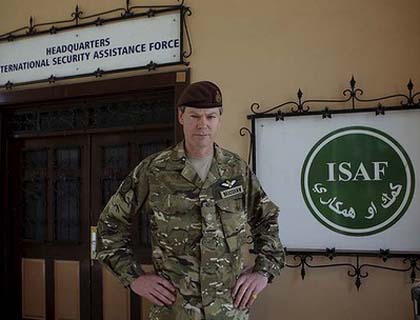WASHINGTON - The Taliban will mount a campaign this year that is increasingly reliant on suicide bombings and improvised explosive devices in Afghanistan's south and east, says one of International Security Assistance Force's most senior officers.
It would also continue to attempt mass casualty attacks in Kabul - both campaigns being responses to the Taliban's weakening grip across the country.
''The insurgency has not given up. We know they're going to remount their attacks,'' the ISAF's deputy operations officer, Australian Brigadier Roger Noble, told the Herald.
Regarding Uruzgan, where Australia has about 1000 soldiers serving at four patrol bases and its capital, Tarin Kowt, he said: ''It's an important province in [Afghanistan's] layout, and you're going to see attempts by the insurgents to reinsert and to influence it.''
His comments come after one of the most disheartening periods in the decade-long war, with the Afghan winter seeing a series of Coalition soldiers killed by the Afghan National Army soldiers they were working with; the burning by US forces at Bagram air base of copies of the Koran; images of soldiers urinating on Taliban corpses shown around the world; and the massacre of civilians in Kandahar by an unhinged US marine.
With the deadline for the end of Coalition combat operations - December 2014 - drawing closer, the incidents have obscured what the ISAF generals would say is a steadily improving security situation as a result of a push by an increased number of Coalition troops in 2011.
''For the first time, we saw the momentum of the insurgency reversed,'' the deputy commander of ISAF forces in Afghanistan, the British Lieutenant-General Adrian Bradshaw, said.
And while the incidents such as the Koran burning had caused much angst, they had not affected the underlying strength of the relationship between the Coalition and Afghan forces.
''[The incidents] come as much of a surprise to us as they have the Afghans, and clearly those that are within our gift to do anything about, we've worked extremely hard to make sure they can't be repeated,'' General Bradshaw said.
''But the Afghans are being equally pragmatic about this. They know that [the Koran burning] was not intentionally directed at insulting their religion or culture. They take it to be a grievous error of ignorance, and they've accepted that.''
The situation in Afghanistan is particularly precipitous at the moment, as the days tick down to next month's NATO conference in Chicago, where the size of the international community's 10 year post-2014 commitment to the war-torn nation will be decided.
Brigadier Noble also discussed the so-called ''green on blue'' attacks - Afghan soldiers or police targeting Coalition troops.
Three Australian Diggers were killed during an incident in Kandahar province in November, and a further three were wounded in a similar attack on 11 days later at a base in Uruzgan's Mirabad Valley.
ISAF had assessed that only a small percentage, less than 10 per cent, could be definitively attributed to Taliban ''infiltration'' attacks, Brigadier Noble said.
Other senior ISAF officers echo his assessment, and say about 30 per cent are believed to be attributed to combat stress and individual reasons.
The remaining half saw the attacker killed, and the reasons could not be established. (Agencies)

